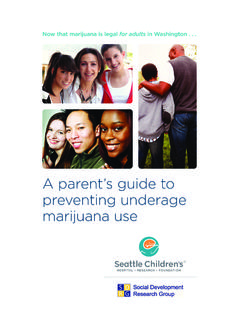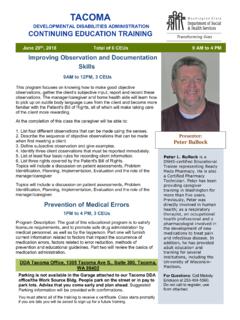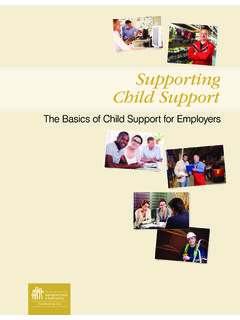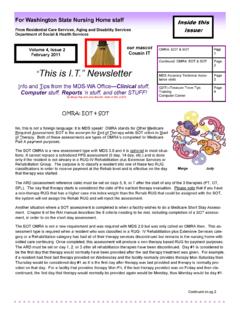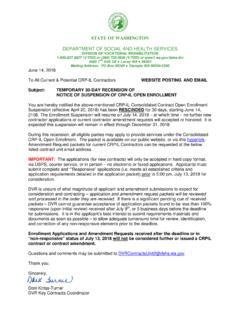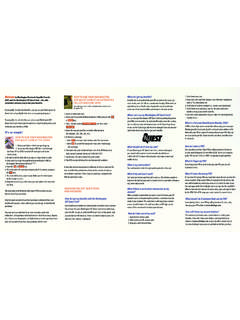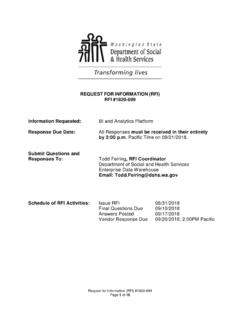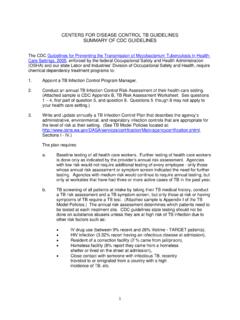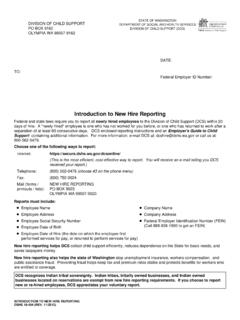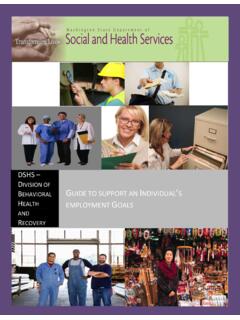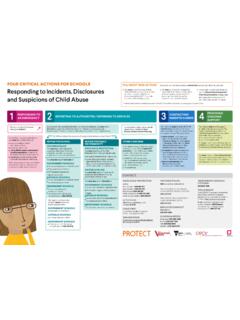Transcription of DEVELOPMENTAL DISABILITIES ADMINISTRATION Olympia ...
1 DEVELOPMENTAL DISABILITIES ADMINISTRATION . Olympia , Washington TITLE: INCIDENT MANAGEMENT AND REPORTING REQUIREMENTS FOR RESIDENTIAL SERVICE PROVIDERS. Authority: Title 71A RCW DEVELOPMENTAL DISABILITIES Chapter RCW Abuse of Children Chapter RCW Abuse of Vulnerable Adults Chapter 388-101 WAC Certified Community Residential Services and Supports Chapter 388-101D WAC Requirements for Providers of Residential Services and Supports Chapter 388-825 WAC DEVELOPMENTAL DISABILITIES Services Chapter 388-826 WAC Voluntary Placement Services Chapter 388-145 WAC Licensing Requirements for Group Care Facilities and Services PURPOSE.
2 This policy establishes uniform reporting requirements and procedures for community residential service providers regarding incidents that involve clients enrolled with the DEVELOPMENTAL DISABILITIES ADMINISTRATION (DDA). This policy also addresses reporting allegations of suspected abuse, improper use of restraint, neglect, self-neglect, personal or financial exploitation, abandonment, and mistreatment. SCOPE. This policy applies to the following DDA community residential service providers, their employees, contractors, and volunteers: For adults: Alternative living (AL). Community intermediate care facility for individuals with intellectual DISABILITIES (ICF- IID).
3 Companion homes (CH). Diversion bed programs Group homes (GH). Group training homes (GTH). CHAPTER 6. DDA POLICY MANUAL PAGE 1 OF 20 ISSUED 7/2019. TITLE: INCIDENT MANAGEMENT AND REPORTING REQUIREMENTS FOR RESIDENTIAL SERVICES PROVIDERS. Overnight planned respite services for adults State-operated living alternatives (SOLA). Supported living (SL). For children: Children's enhanced respite beds Community crisis stabilization service (CCSS). Licensed child foster homes Licensed group care facilities Licensed staffed residential (LSR). State-operated living alternatives (SOLA). DEFINITIONS. See Attachment A for a list of terms that apply to this policy.
4 POLICY. A. Service provider administrators, owners, employees, contractors, and volunteers who have reasonable cause to believe there has been abuse, improper use of restraint, neglect, personal or financial exploitation, or abandonment of a client must follow the requirements of Chapters RCW and RCW and make a report to the Department of Social and Health Services (DSHS). B. An allegation or suspicion of sexual or physical assault as outlined in this policy must also be reported to law enforcement. C. Client injuries of unknown origin and allegations of self-neglect must also be reported according to this policy.
5 D. Mandated reporters do not have to witness or have proof that an incident occurred. As long as there is reasonable cause to suspect that a child or a vulnerable adult has been abused, improperly restrained, neglected, personally or financially exploited, or abandoned, a mandated reporter must make a report. E. Failure to report can result in disciplinary action. Failure to report such incidents may result in termination of the service provider's contract. Furthermore, failure to report is a gross misdemeanor under RCW Any service provider employee, contractor, or volunteer found to have knowingly failed to fulfill their mandatory reporting obligation will be reported to the appropriate law enforcement agency and may be prosecuted.
6 CHAPTER 6. DDA POLICY MANUAL PAGE 2 OF 20 ISSUED 7/2019. TITLE: INCIDENT MANAGEMENT AND REPORTING REQUIREMENTS FOR RESIDENTIAL SERVICES PROVIDERS. F. If a service provider, an employee, contractor, or volunteer of a service provider is being investigated by Adult Protective Services (APS), Child Protective Services (CPS), Division of Licensed Resources (DLR), Residential Care Services (RCS), or law enforcement, the service provider must: 1. Take appropriate action to ensure the health and safety of DDA clients; and 2. Take appropriate administrative action upon receipt of the investigation findings. G. Agencies must have a designated person responsible for communication in each DSHS.
7 Region in which they hold a contract. Agencies must cooperate with DDA staff regarding inquiries about incidents, incident follow up, and closure. H. Residential services providers must develop a system that provides for administrative review of reportable incidents to implement proper safeguards for all persons supported by the service provider as well as employees of the service provider. Refer to Procedures Section (C)(3) for more details. See Attachment C, Incident Reporting Timelines, for a list of reportable incidents. PROCEDURES. A. Mandatory Reporting of Abuse, Improper use of Restraint, Neglect, Self-Neglect, Personal or Financial Exploitation, Abandonment A person does not have to witness an incident to report it.
8 A service provider, employee, contractor, or volunteer who witnesses or has reasonable cause to suspect an incident must make a report themselves. 1. A mandated reporter must report to APS, CPS, or the Complaint Resolution Unit (CRU) if they witness any of the following or suspect that any of the following have occurred: a. Abuse, improper use of restraint, neglect, self-neglect, personal or financial exploitation, or abandonment;. b. Any physical or sexual assault ;. c. Physical or sexual abuse, neglect, or exploitation of a child; or d. An act that causes fear of imminent harm. 2. Report to law enforcement if there is reason to suspect that any of the following has occurred against a DDA client: a.
9 sexual assault ;. CHAPTER 6. DDA POLICY MANUAL PAGE 3 OF 20 ISSUED 7/2019. TITLE: INCIDENT MANAGEMENT AND REPORTING REQUIREMENTS FOR RESIDENTIAL SERVICES PROVIDERS. b. Physical assault (non-client to client);. c. Any act that causes fear of imminent harm; or d. Physical assault (client-to-client): Any alleged or suspected physical assault that causes bodily injury requiring more than first aid, or in the event of: 1) Injuries, such as bruises or scratches, that appear on the back, face, head, neck, chest, breasts, groin, inner thigh, buttock, genital, or anal areas;. 2) Fractures;. 3) Choking attempts;. 4) Patterns of physical assault between the same vulnerable adults or involving the same vulnerable adults; or 5) Any client-to-client assault , regardless of injury, if requested by the client, the client's legal representative, or family member.
10 3. Report to the coroner or medical examiner if there is reason to suspect that the death of a vulnerable adult was caused by abuse, neglect, or abandonment. See RCW (5). 4. Report to the Department of Health if a person with a certification or license through the Department of Health: a. Is the alleged perpetrator in an incident involving suspected abuse, neglect, or exploitation; or b. Has some other issue relating to their license or certification. B. Incident Reporting Timelines 1. Incidents must be reported to DDA within the required timelines. 2. One-hour protocol incidents must be reported to the client's CRM by phone no more than one hour after the provider becomes aware of the incident, or as soon as client safety has been established.
